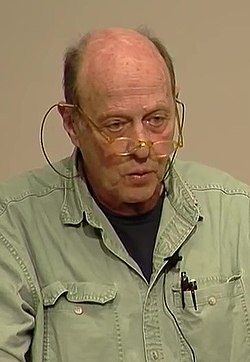James C. Scott Quote
Social order is not the result of the architectural order created by T squares and slide rules. Nor is social order brought about by such professionals as policemen, nightwatchmen, and public officials. Instead, says Jacobs, the public peace—the sidewalk and street peace—of cities … is kept by an intricate, almost unconscious network of voluntary controls and standards among the people themselves, and enforced by the people themselves.
James C. Scott
Social order is not the result of the architectural order created by T squares and slide rules. Nor is social order brought about by such professionals as policemen, nightwatchmen, and public officials. Instead, says Jacobs, the public peace—the sidewalk and street peace—of cities … is kept by an intricate, almost unconscious network of voluntary controls and standards among the people themselves, and enforced by the people themselves.
Related Quotes
About James C. Scott
James Campbell Scott (December 2, 1936 – July 19, 2024) was an American political scientist and anthropologist specializing in comparative politics. He was a comparative scholar of agrarian and non-state societies.
Trained as a political scientist, Scott's scholarship discussed peasant societies, state power, and political resistance. From 1968 to 1985, Scott wrote influentially on agrarian politics in peninsular Malaysia. While he retained a lifelong interest in Southeast Asia and peasantries, his later works ranged across many topics: quiet forms of political resistance, the failures of state-led social transformation, techniques used by non-state societies to avoid state control, commonplace uses of anarchist principles, and the rise of early agricultural states.
Scott received his bachelor's degree from Williams College and his MA and PhD in political science from Yale. He taught at the University of Wisconsin–Madison until 1976 and then at Yale, where he was Sterling Professor of Political Science. In 1991, he became director of Yale's Program in Agrarian Studies. At the time of his death, The New York Times described Scott as among the most widely read social scientists.
Trained as a political scientist, Scott's scholarship discussed peasant societies, state power, and political resistance. From 1968 to 1985, Scott wrote influentially on agrarian politics in peninsular Malaysia. While he retained a lifelong interest in Southeast Asia and peasantries, his later works ranged across many topics: quiet forms of political resistance, the failures of state-led social transformation, techniques used by non-state societies to avoid state control, commonplace uses of anarchist principles, and the rise of early agricultural states.
Scott received his bachelor's degree from Williams College and his MA and PhD in political science from Yale. He taught at the University of Wisconsin–Madison until 1976 and then at Yale, where he was Sterling Professor of Political Science. In 1991, he became director of Yale's Program in Agrarian Studies. At the time of his death, The New York Times described Scott as among the most widely read social scientists.
